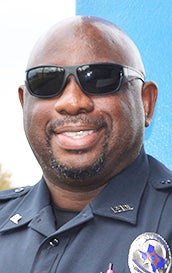ASK A COP — Can drivers go 5 mph over the speed limit?
Published 12:18 am Wednesday, October 4, 2023
|
Getting your Trinity Audio player ready...
|
Jason asks: I’ve been driving for quite some time and was told something many moons ago and am wondering if it’s even true. Is it true that police officers will allow motorists 5 mph over the speed limit before they are considered speeding?
Answer: This is probably the biggest misconception motorists have when it comes to law enforcement on speeders. The posted white sign with black letters/numbers and says speed LIMIT is the law and not a suggestion. Any speed above the speed limit sign is a violation of the Texas Transportation Code. You can be stopped and issued a citation for speeding for going 1 mph over the posted sign. There’s one word missing on the speed limit sign that would stop any confusion, and that word is MAXIMUM. The sign should read “maximum speed limit.” You’re welcome to drive at or under the posted sign, just not over. I will admit most law enforcement officers don’t routinely stop and issue citations for motorists who are going 5 mph over the posted speed limit sign, because they’re looking for those motorists who pose the greater risk of danger on our roadways, like those going 10 plus mph over the speed limit. Keep in mind anytime you go over the posted speed limit sign, you’re giving any law enforcement officer the right to stop you.
Francis asks: Can you help us understand the difference between pleading guilty and no contest in court?
Answer: There are only five states that allow the no contest or nolo contendere, and they are Alaska, California, Florida, Virginia and the great state of Texas. There’s really no difference in the plea of no contest and guilty, because when pleading no contest in a criminal court, the punishment will basically have the same effect as if one pled guilty. What this nolo contendere or no contest plea does is afford a defendant to go through the process without having to admit guilt by actually pleading GUILTY! If a civil action is filed after the criminal trail where no contest was uses, that can’t be used as evidence against the respondent party of the action.
Katy asks: What is the procedure for a railroad arm that’s stuck down with its light flashing for an extended period of time? If there is no train in sight, what are drivers to do? It makes no sense to just sit at a place where the lights are obviously malfunctioning.
Answer: This is a very simple question that apparently many people are lacking clarity. When you are stopped at a railroad crossing where the arms are malfunctioning, red lights flashing and clearly no train in sight, you simply “WAIT,” or you can elect to turn around and go the other direction. If you see someone go between the railroad’s arms, that doesn’t mean follow the leader because. Every three hours someone is involved in a train crash in this country. Railroad deaths totaled 954 in 2022, an 11 percent increase from the 2021 revised total of 859 and the highest since 2007. Nonfatal injuries totaled 6,252, a 6 percent increase from the 2021 revised total of 5,882 because drivers failed to take the railroad warning seriously, and ultimately paying with their lives. This has prompted the slogan “STOP BECAUSE TRAINS CAN’T!” Just be informed the next time you happen to be in line at a railroad crossing, you are free to turn around and go around the intersection. Just don’t go around the arms.
Join Me, Officer Rickey Antoine and the CREW, Stephen “Buzzard Boots” Mosley, Lelo “mouth of Hwy 69/73” I Washington and Tejas “Lil Man” Morning Star for Ask A Cop live, on KSAP 96.9 FM The Breeze radio station every Tuesday for at least two hours from 1 to 3 p.m. You can also tune in at ksapthebreeze.org. Call in and ask your question live at 409-982-0247. Feel free to email questions to rickey.antoine@portarthurtx.gov, call 409-983-8673 and leave a voicemail question or mail them to: Ofc. Rickey Antoine, 645 4th Street, Port Arthur, Texas, 77640. If you happen to see me in public, you can always feel comfortable to approach and “Ask A Cop!”







